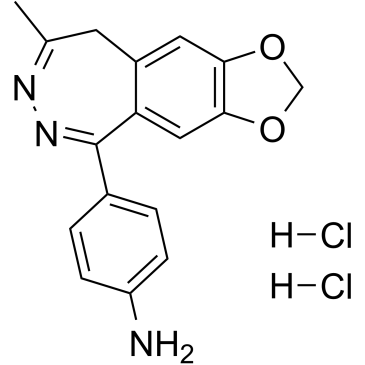2319722-40-0
| Name | GYKI 52466 dihydrochloride |
|---|
| Description | GYKI 52466 dihydrochloride is a potent, selective, orally active and non-competitive kainate- and AMPA-activated currents antagonist with IC50s of 7.5 μM and 11 μM, respectively. GYKI 52466 dihydrochloride is inactive against N-methyl-D-aspartate (NMDA) or γ-aminobutyric acid responses. GYKI 52466 dihydrochloride ia a muscle relaxant and anticonvulsant agent, and has good blood brain barrier permeability[1][2]. |
|---|---|
| Related Catalog | |
| Target |
IC50: 7.5 μM (Kainate receptor) and 11 μM (AMPA receptor)[1] |
| In Vitro | In kinetic experiments with kainate as the agonist, the GYKI 52466 binding and unbinding rates were 1.6 x 105 M-1 s-1 and 3.2 s-1, respectively. GYKI 52466 also suppresses non-NMDA receptor-mediated spontaneous synaptic currents via a postsynaptic action[1]. |
| In Vivo | GYKI 52466 (1.76-13.2 mg/kg; male and female DBA/2 mice; intraperitoneal injection) treatment provides potent anticonvulsant protection against sound-induced seizures in seizure-susceptible DBA/2 mice. The ED50 value at 15 min for the protection against sound-induced seizures in DBA/2 mice is 13.7 (11.5-16.5) μmol/kg (GYKI 52466, i.p.)[2]. GYKI 52466 provides potent anticonvulsant protection against AMPA-induced seizures in Swiss mice. Maximal anticonvulsant protection is observed 5-15 min after the i.p. administration of GYKI 52466 in DBA/2 mice. The ED50 values for the protection against AMPA-induced seizures by GYKI 52466 (15 min, i.p.) is 18.5 (11.5-29.5) μmol/kg[2]. Animal Model: Male and female DBA/2 mice (3-4-week-old) induced sound[2] Dosage: 1.76-13.2 mg/kg (6-45 μmol/kg) Administration: Intraperitoneal injection; once Result: Provided potent anticonvulsant protection against sound-induced seizures in seizure-susceptible DBA/2 mice. |
| References |
| Molecular Formula | C17H17Cl2N3O2 |
|---|---|
| Molecular Weight | 366.24 |
